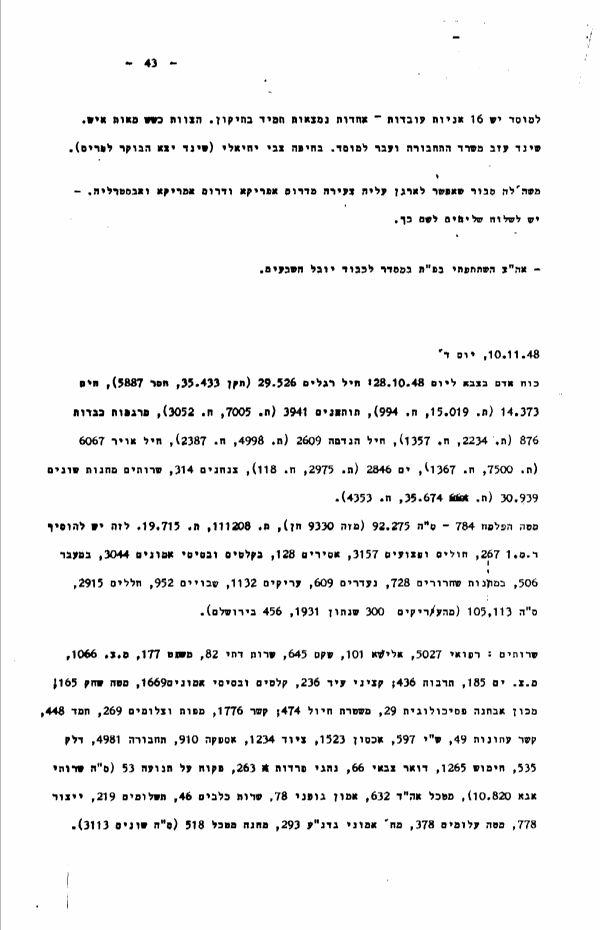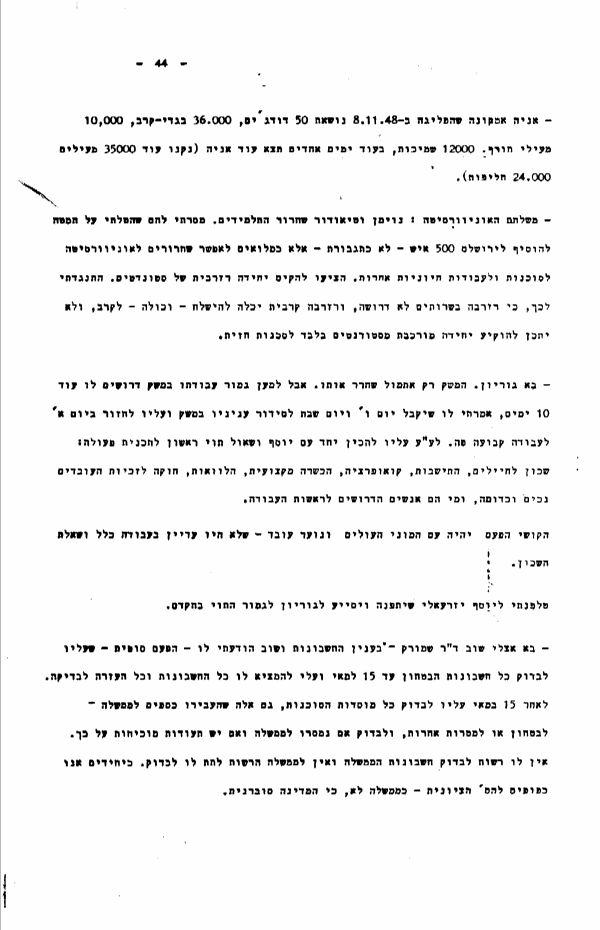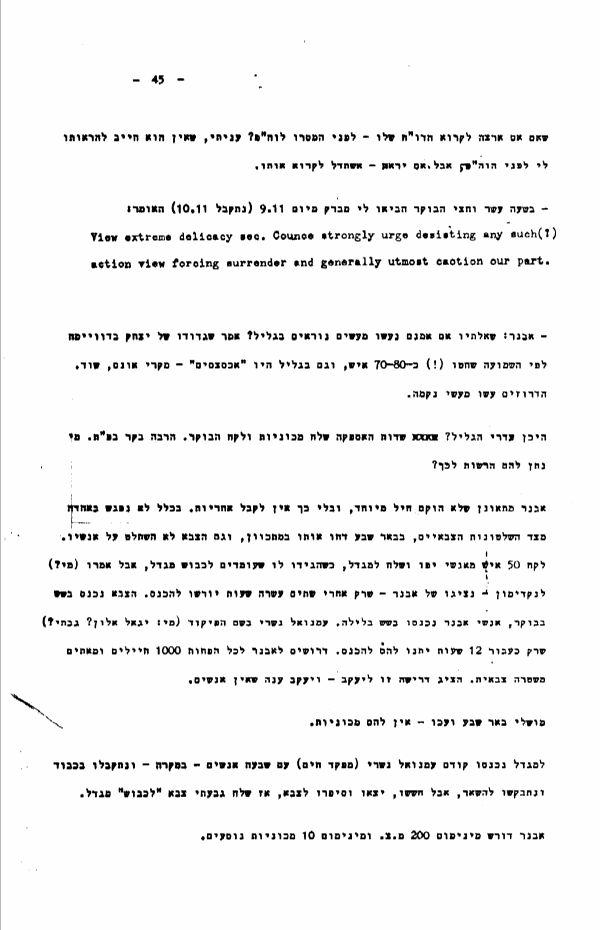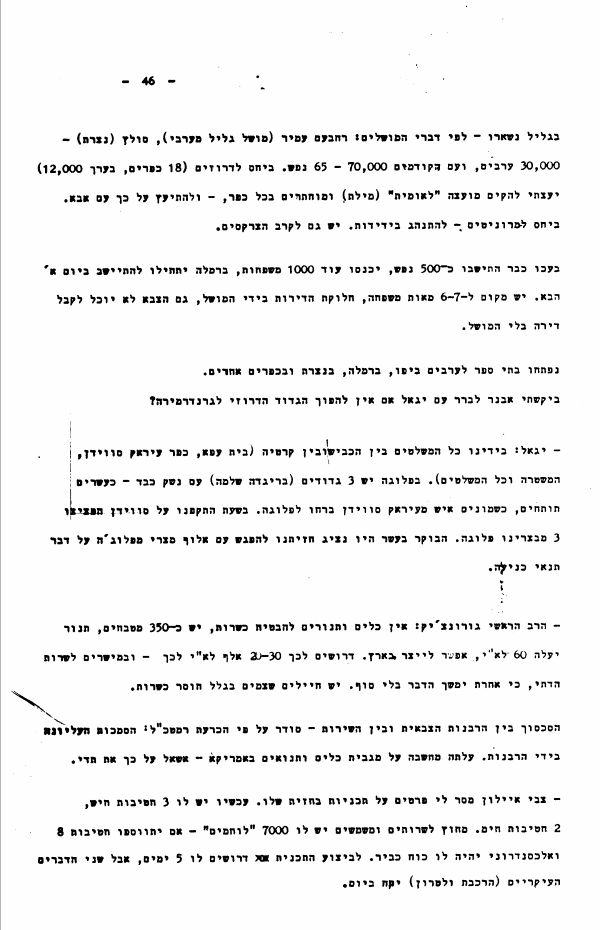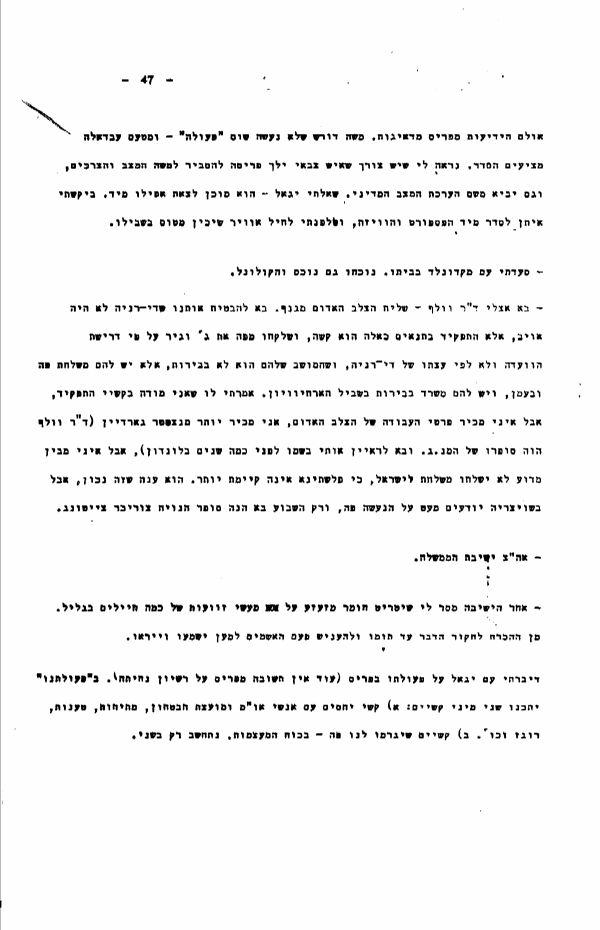Wednesday, November 10, 1948
The army's manpower as of October 28, 1948: infantry 29,526 (standard 35,433, shortfall 5,887), garrison 14,373 (st. 15,019, sh. 994), Artillery Corps 3,941 (st. 7,005, sh. 3,052), heavy mortars 876 (st. 2,234, sh. 1,357), Engineering Corps 2,609 (st. 4,998, sh. 2,387), Air Force 6,067 (st. 7,500, sh. 1,367), Navy 2,846 (st. 2,975, sh. 118), paratroopers 314, services [at] various camps 30,939 (st. 35,674, st. 4,353).
Palmach Staff 784 - total 92,275 (including 9,330 WC [Women'sCorps]), st. 111,208, sh. 19,715. Add to this R.M.1 [combined list?] 267, ill and wounded 3,157, prisoners 128, in intake facilities and training bases 3,044, in transit 506, in discharge camps 728, missing 609, deserters 1,132, POWs 952, fallen 2,915, total 105,113 (of the deserters 300 [were born in] 1931, 456 are in Jerusalem).
Services: medical 5,027, Elisha [?] 101, Shekem [food services] 645, religious service 82, judicial 177, M.P. [military police?] 1,066, naval M.P. 185, culture 436, city officers 236, intake facilities and training bases 1,669, Moshe Shahak 165, psychological diagnosis center 29, enlistment police 474, signal 1,776, mapping and photography 269, Science Corps 448, press liaison 49, SHAI [information service, i.e., intelligence] 597, housing 1,523, equipment 1,234, supplies 910, transport 4,981, fuel 535, armament 1,265, military post 66, mule handlers 263, transport oversight 53 (total Logistics Department services 10,820), training bureau general staff 632, physical training 78, canine service 46, payments 219, production 778, youth [services] staff 378, GADNA training camp 293, General Staff camp 518 (total miscellaneous 3,113).
- The ship Ascona [sp.], which set sail on November 8, 1948, is carrying 50 Dodge [trucks], 36,000 combat uniforms, 10,000 winter coats. 12,000 blankets. In a few days another ship will set out (another 35,000 coats, 24,000 uniforms were bought).
- University delegation: Neumann and Theodore [sp.]: The release of students [from military service]. I told them that I instructed the Staff to add 500 men to Jerusalem - not as reinforcement but as reserves to enable releases for the university, for the [Jewish] Agency, and for other vital work assignments. They suggested establishing a reserve unit of students. I objected to this because a reserve isn't needed in the services, and a combat reserve can be sent - in its entirety - to battle, and a unit composed entirely of students cannot be exposed to the dangers of the front.
- [Yosef] Gurion [from Kibbutz Geva, designated to head the Rehabilitation Department] came. The kibbutz only released him yesterday, but he needs 10 more days to finish his work at the kibbutz. I told him that he'd have Friday and Saturday to settle his affairs at the kibbutz, and he must return on Sunday to full-time work here. Right now, along with Yosef [Yizraeli] and Shaul [Avigur], he must prepare an initial outline for an action plan: housing for soldiers, settlement, cooperative enterprise, vocational training, loans, a law on the rights of workers, disabled, and the like, and what personnel are needed to start the work.
The difficulty this time will be with masses of immigrants and No'ar Oved [youth movement affiliated with the labor movement?] - who haven't been part of the labor [force] at all yet, and the question of housing.
I telephoned Yosef Yizraeli [to say] that he should make himself available and help Gurion finish the outline quickly.
- Dr. [Emil] Schmorak [Jewish Agency comptroller] came to see me again - regarding the accounts, and again I informed him - this time for the last time - that he must examine all the defense accounts through May 15 [1948], and I must provide him with all the accounts [financial information] and all the assistance [needed] for [his] examination. After May 15 he must examine all the Agency institutions, including those that transferred funds to the government - for defense or other purposes - and examine whether they were turned over to the government, and if there are documents proving this. He doesn't have permission to examine government accounts, and the government doesn't have permission to allow him to examine [them]. As individuals we're subordinate to the Zionist Organization - as a government [we're] not, because the state is sovereign. He asked whether I want to read his report - before it's turned over to the [Zionist] General Council. I answered that he isn't obligated to show it to me before the General Council, but if he does show it - I'll make an effort to read it.
- At 10:30 a.m. I was given a cable from November 9 (received November 10) that stated: "View extreme delicacy sec. Counce [sic] strongly urge desisting any such (?) action view forcing surrender and generally utmost caotion [sic] our part."
[Elimelech] Avner [commander of the military government]: I asked him whether terrible acts had indeed been committed in the Galilee. He said that according to the rumor a battalion of Yitzhak's [Battalion 89 of the 8th Brigade, under Yitzhak Sadeh] in Dawayima [east of the Faluja pocket] had slaughtered (?) about 70-80 people, and in the Galilee as well there had been "excesses" - incidents of rape, theft. The Druze engaged in acts of vengeance.
Where are the herds of the Galilee? The supply service sent vehicles and took the cattle. A lot of cattle is in Petah Tikva. Who gave them permission for this?
Avner is complaining that a special corps hasn't been established [for the military government], and without this - it's not possible to take charge. In general, he hasn't encountered goodwill on the part of the military authorities. In Beersheva he was deliberately sidelined, and the army didn't control its own men. [He] took 50 men from
Jaffa and sent them to Majdal, when they told him that they're going to conquer Majdal. But [they] (who?) told [Moshe] Nakdimon - Avner's representative - that they'd only be permitted to enter 12 hours later. The army entered at 6 a.m., Avner's men entered at 6 p.m. Emanuel Nishri [announced] on behalf of the command (who: Yigal Allon? Givati?) that they would only be allowed to enter in 12 hours.
Avner needs at least 1,000 soldiers and 200 military policemen. He presented this demand to Ya'akov [Dori] - and Ya'akov replied that there are no men.
The governors of Beersheba and Acre have no vehicles.
Emanuel Nishri (garrison commander) had entered Majdal earlier with seven individuals - coincidently - and they were received honorably and asked to stay, but they had concerns, left and told the army, and then Givati sent forces "to conquer" Majdal.
Avner demands a minimum of 200 MP [military policemen] and a minimum of 10 passenger vehicles.
[The following] remain in the Galilee - according to the governors[:] Rehavam Amir (governor of the Western Galilee), Elisha Soltz (Nazareth): 30,000 Arabs, and with the previous ones 65-70,000 persons. Regarding the Druze (18 villages, about 12,000), I advised establishing a "national" council (a millet [from the Ottoman administrative system]) and mukhtars [village leaders] in each village, and consulting on this with Abba [Khoushy]. Regarding the Maronites - to be friendly. The Circassians should also be embraced.
About 500 persons [Jews] have already settled in Acre, another 1,000 families will arrive. In Ramle [people] will start settling next Sunday. There's space for 6-700 families; the distribution of apartments is in the hands of the governor; even the army won't be able to get an apartment without the governor.
Schools for Arabs were opened in Jaffa, Ramle, Nazareth, and a few villages.
I asked Avner to clarify with Yigael [Yadin] whether the Druze battalion shouldn't be turned into a a gendarmerie.
Yigael [Yadin]: All the strongholds between the road and Karatiyya (Beit ''Affa, the village of Iraq-Suweidan, the police [station], and all the strongholds) are in our hands. In Faluja there are 3 [Egyptian] battalions (an entire brigade) with heavy weapons - about 20 cannons; about 80 people from Iraq-Suweidan fled to Faluja. At the time of our attack on [Iraq-]Suweidan 3 of our "Fortresses" bombed Faluja. This morning at 10, a representative of our front was [supposed to] meet with an Egyptian major-general from Faluja regarding terms of surrender.
- Chief Rabbi Goronczik [Goren]: [We] don't have the kitchenware and stoves needed to ensure kashrut. There are about 350 kitchens, a stove will cost P£ 60, can be manufactured in the country. This requires P£ 20-30,000 - and directly to the religious service, because otherwise the matter will take forever. There are soldiers who fast because of the lack of kashrut.
The dispute between the Military Rabbinate and the [religious] service was sorted out by a decision of the chief of staff: the paramount authority lies with the Rabbinate. The idea of a donation drive for kitchenware and stoves in America was raised - I'll ask Teddy [Kollek] about this.
- Zvi Ayalon [commander of the Center ("Merkaz") Front] gave me the details of plans for his front. He now has 3 Hayish [Field Corps] brigades, 2 garrison brigades. Aside from services and service personnel [?] he has 7,000 "fighters"- if the Alexandroni and 8th brigades are added, he'll have a tremendous force. He needs 5 days to implement the plan. But the two main things (the train [the railway to Jerusalem] and Latrun) he can take in [one] day.
However, the news from Paris is worrying. Moshe [Sharett] demands that we not take any "action" - and from Abdallah's side [they're] proposing an arrangement. It seems to me that it's necessary to have a military person go to Paris to explain the situation and the needs to Moshe, and also to bring an assessment of the political situation from there.
I asked Yigael [Yadin] - he's prepared to go, even immediately. I asked him to arrange the passport and visa immediately, and I telephoned the Air Force to prepare a plane for him.
- I dined with [US Ambassador James] McDonald in his home. Knox and the colonel [military attaché] were also present.
- Dr. Wolf - the Red Cross representative [in] Geneva - came to see me. He came to promise us that de Reynier was not an enemy, but his role under these circumstances is a difficult one, and they pulled Guy [sp.] and [Dr.] Guiller [sp.] out of here not because of a demand by the Committee or advice from de Reynier, and their seat is not in Beirut; rather, they have a delegation here and in Amman, and they have an office in Beirut for the archives. I told him that I acknowledge the difficulties of the position, but I'm not familiar with the details of the Red Cross's work, more familiar with the Manchester Guardian (Dr. Wolf was a writer with this newspaper and came to interview me for it a few years ago in London), but I don't understand why they won't send a delegation to Israel, because Palestine doesn't exist anymore. He replied that this is true, but in Switzerland they know little about what is going on here, and it was only this week that a writer for the Neue Zürcher Zeitung arrived here.
- In the afternoon a government meeting.
- After the meeting [Bechor] Sheetrit [minister of the police and minorities] gave me shocking information about atrocities committed by a few soldiers in the Galilee. It's imperative that the matter be investigated thoroughly and the perpetrators punished, to make people hear and beware [i.e., as a warning to others].
- I spoke with Yigael [Yadin] about his task in Paris (there isn't a response from Paris yet about permission to land). Our "action" might encounter two types of problems: A) problems in [our] relations with UN and the Security Council personnel, tension, complaints, aggravation, etc. B) problems created for us here - by the major powers. We'll only take the second into consideration.





